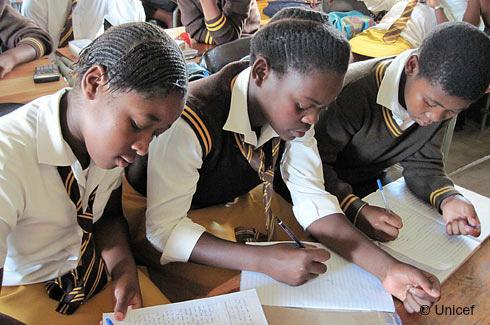School-based HPV vaccination campaign wraps up
- /
- / Health, News, Our Health


As a school campaign to inoculate girls against one of the leading causes of cervical cancer wraps in the Northern Cape’s Siyancuma Local Municipality, one nurse says parents need to know more about the human papillomavirus (HPV).
This month, grade 4 girls lined up for their second vaccination against HPV that will protect them from developing cervical cancer later in life. About 350 000 grade 4 girls 9 years and older received the first injection of this two-dose vaccine in March and April this year, according to the National Department of Health.
The campaign recently concluded in Douglas, Northern Cape in the province’s Siyancuma Local Municipality. Sister Mitzi Prinz helped lead the Douglas leg of the campaign and says awareness – and community buy-in – could be improved.
[quote float=”left”]“We still have a long way to go but we’ll get there,”
“Not everyone in our municipality had been informed regarding this campaign and that’s why not all parents and guardians gave permission for girls to be vaccinated,” said Prinz, who added that the vaccination programme was carried out in about 14 schools.
A lack of awareness is despite door-to-door efforts by local community health care workers to inform guardians about the benefits of the jab for young girls.
“We still have a long way to go but we’ll get there,” said Prinz, who also encouraged women who are sexually active to go for regular Pap smears.
In the public health sector, HIV negative women only get three free Pap smears starting at the age of 30, while HIV positive women are allowed more screenings because they are at higher risk of developing cervical cancer.
Author
Republish this article
This work is licensed under a Creative Commons Attribution-NoDerivatives 4.0 International License.
Unless otherwise noted, you can republish our articles for free under a Creative Commons license. Here’s what you need to know:
You have to credit Health-e News. In the byline, we prefer “Author Name, Publication.” At the top of the text of your story, include a line that reads: “This story was originally published by Health-e News.” You must link the word “Health-e News” to the original URL of the story.
You must include all of the links from our story, including our newsletter sign up link.
If you use canonical metadata, please use the Health-e News URL. For more information about canonical metadata, click here.
You can’t edit our material, except to reflect relative changes in time, location and editorial style. (For example, “yesterday” can be changed to “last week”)
You have no rights to sell, license, syndicate, or otherwise represent yourself as the authorized owner of our material to any third parties. This means that you cannot actively publish or submit our work for syndication to third party platforms or apps like Apple News or Google News. Health-e News understands that publishers cannot fully control when certain third parties automatically summarise or crawl content from publishers’ own sites.
You can’t republish our material wholesale, or automatically; you need to select stories to be republished individually.
If you share republished stories on social media, we’d appreciate being tagged in your posts. You can find us on Twitter @HealthENews, Instagram @healthenews, and Facebook Health-e News Service.
You can grab HTML code for our stories easily. Click on the Creative Commons logo on our stories. You’ll find it with the other share buttons.
If you have any other questions, contact info@health-e.org.za.
School-based HPV vaccination campaign wraps up
by PolaoK, Health-e News
October 31, 2014
MOST READ
Prolonged power outage leaves hospitals in the dark for two days
There’s more to self-care than scented candles or massages, it’s a key public health tool
Malaria can’t be beaten without political will and more funding
Access to clean water and stable electricity could go a long way to addressing rising food poisoning in SA
EDITOR'S PICKS
Related

‘Unbearable’ Northern Cape clinic gets cleaner after almost a year


